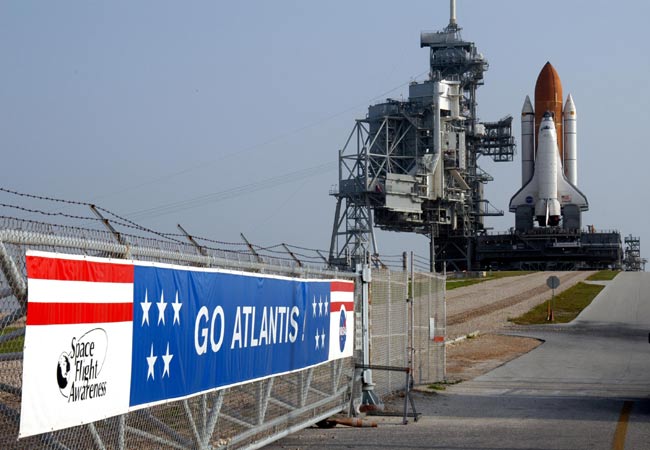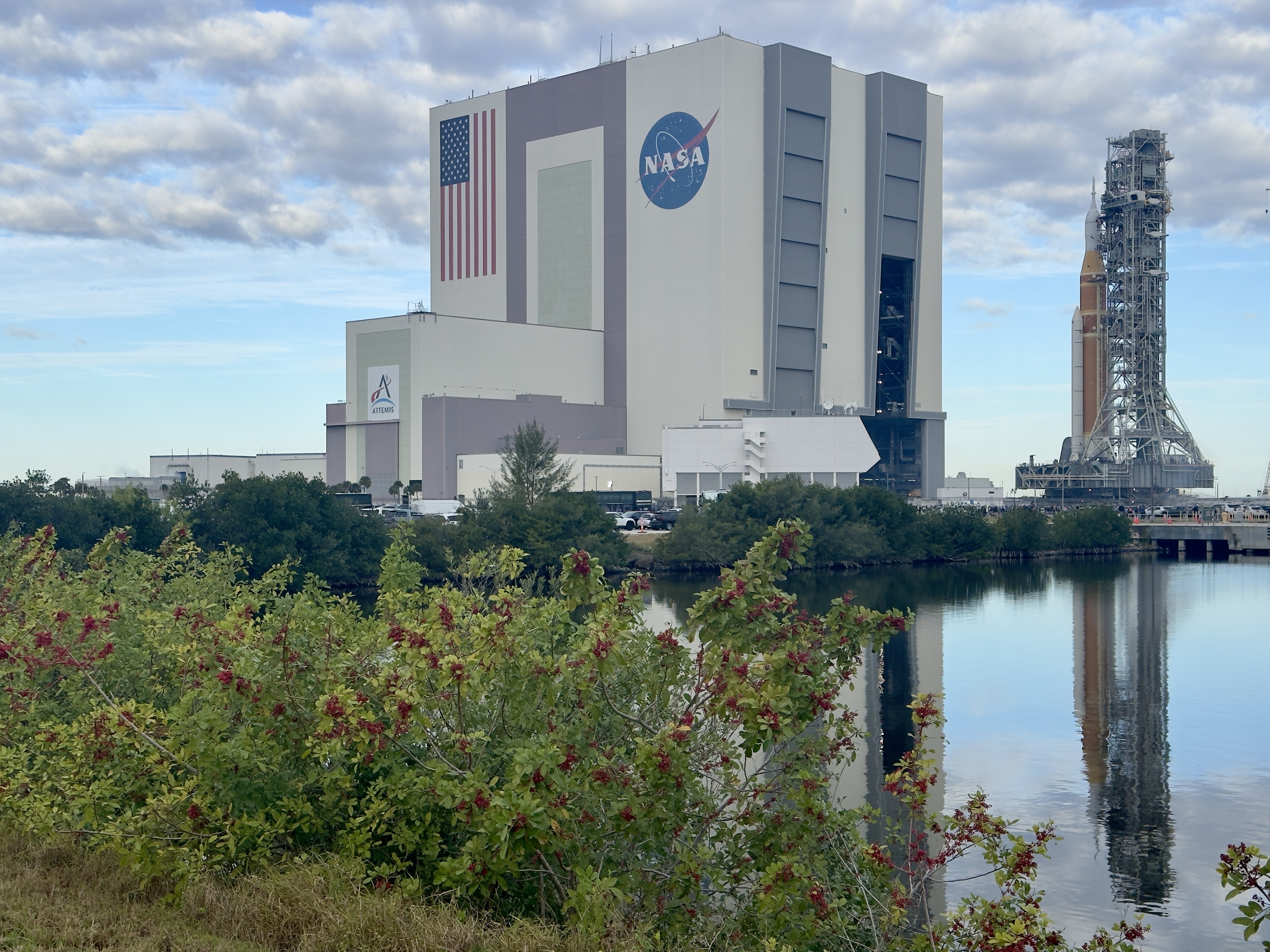Space Shuttle Atlantis to Launch Aug. 27, NASA Says

NASA's shuttle Atlantis and its six-astronautcrew will launch toward the International SpaceStation (ISS) on Aug. 27 provided engineers conquer some final issues,among them a possible antennabolt swap, agency officials said Wednesday.
Topspaceflight officials voted unanimously to press ahead with Atlantis STS-115mission today after an extended two-day meeting at NASA's Kennedy SpaceCenter (KSC) in Florida, William Gerstenmaier, NASA's associate administratorfor space operations, said in a press briefing Wednesday following a FlightReadiness Review.
Two seniorNASA directors - in charge of the agency's Johnson Space Center and MarshallSpace Flight Center - gave their approval with the caveat that some shuttlefuel tank modifications be made as soon as possible, Gerstenmaier added.
"This was agreat review and I'm looking forward to moving toward a great launch," NASAchief Michael Griffin said of the meeting, adding that the agency is alreadycommitted to making the next fuel tank fix - the removal of several icefrost ramps to reduce the amount of foam insulation debris at launch - intwo shuttle flight's time.
Atlantisand its STS-115 astronaut crew are now set to launch at 4:30 p.m. EDT (1030 GMT)on Aug. 27 to deliver a new pair of solararrays and truss segments to the ISS. The mission, commanded by veteranshuttle flyer BrentJett, will mark the first major ISS construction flight since late2002.
Thespaceflight will also be NASA's third shuttle mission since the 2003 Columbia accident.
Antennabolt bustle
Breaking space news, the latest updates on rocket launches, skywatching events and more!
Shuttleofficials spent less time debating the ice frost ramp fix and safety of Atlantis'foam-covered external tank, as they did the potential need to replace two boltson a vital antenna attached to the forward right wall of the orbiter's payloadbay, NASA officials said.
Engineersfound that two of four bolts holding Atlantis' Ku-band antenna - which providesvideo, voice and data communications - to the payload bay wall are too shortdespite performing as expected for 26 spaceflights. There is some concernthat the bolts could give way during launch, sending the antenna plunging downthe length of Atlantis' cargo bay and causing serious - possibly catastrophic -damage to the orbiter.
"For thelast 25 years we've been flying with these thread fasteners, bolts, that justbarely have a thread or two engaged into the nut that holds them on," saidNASA's space shuttle program manager Wayne Hale. "That is not good engineeringpractice."
Similarantenna bolts aboard NASA's Discovery and Endeavour orbiters have already beenreplaced with longer units, but the swap will be harder for Atlantis since theshuttle sits in launchposition atop Pad 39B at KSC instead of its maintenance hangar.
"We'veflown 26 times and everything has been okay, and there is a school of thoughtthat suggests it will be okay one more time," Hale said. "But I would ratherhave the engineering data to back that up."
To replacethe antenna bolts, pad workers would have to extend a slim platform out betweenthe top of Atlantis' solar array-truss payload and ISS docking port at theupper end of the orbiter's 60-foot (18-meter) cargo bay.
"Imagineoperating on a surfboard that's tied down at one end, sticking out over asix-story balcony," Hale said. "If we have to do it, it will be done safely andwill be done properly, but if we don't have to do it than that would just begreat too."
A decisionon whether that work is required could be made this weekend. With two extradays built into Atlantis' launch schedule, the extra work- if needed - shouldnot affect the Aug. 27 target, NASA launch director Michael Leinbach said.
Hale alsosaid that engineers are working through a heater thermostat issue on one ofDiscovery's three auxiliary power units (APUs) feeding its hydraulic system todetermine if a similar problem could be present aboard Atlantis.
"Right nowwe think Atlantis has tested out just fine, so whatever problem there is onDiscovery it's likely not there on Atlantis," Hale said.
Unanimousdecision
UnlikeNASA's last shuttle Flight Readiness Review, in which NASA's top safetyofficial - former shuttle commander Bryan O'Conner - and chief engineerChristopher Scolese votedagainst moving ahead with Discovery's STS-121launch, today's final discussion proved less of a contest.
O'Connerand Scolese did not object to the STS-115 launch plan, and added that theflight rationalegiven for Discovery's STS-121mission - in which the riskwas to the orbiter itself but not its astronaut crew - was still valid.[Click herefor Griffin's STS-121 launch rationale].
"I wouldsay that this review was less contentious, maybe not a lot less but I don'twant them to be," Griffin said, adding that airing concerns is a vital part ofthe engineering process. "The point is we don't feel that we're risking crew,and no one in the room felt like we were risking crew."
Even ifAtlantis suffers damage serious enough to force the STS-115 crew to take refugeaboard the ISS and await a rescue mission, the station could support theshuttle astronauts for between 86 and 110 days, NASA station officials saidlast week.
"In theend, everybody said let's go," Griffin said.
- VIDEO: Shuttle Commander Brent Jett
- Complete Space Shuttle Mission Coverage
- NASA's STS-115: Shuttle Atlantis to Jump Start ISS Construction
- The Great Space Quiz: Space Shuttle Countdown

Tariq is the award-winning Editor-in-Chief of Space.com and joined the team in 2001. He covers human spaceflight, as well as skywatching and entertainment. He became Space.com's Editor-in-Chief in 2019. Before joining Space.com, Tariq was a staff reporter for The Los Angeles Times covering education and city beats in La Habra, Fullerton and Huntington Beach. He's a recipient of the 2022 Harry Kolcum Award for excellence in space reporting and the 2025 Space Pioneer Award from the National Space Society. He is an Eagle Scout and Space Camp alum with journalism degrees from the USC and NYU. You can find Tariq at Space.com and as the co-host to the This Week In Space podcast on the TWiT network. To see his latest project, you can follow Tariq on Twitter @tariqjmalik.
